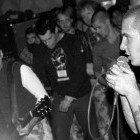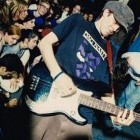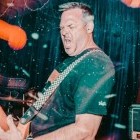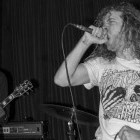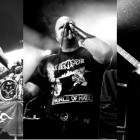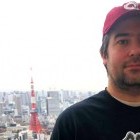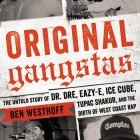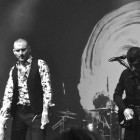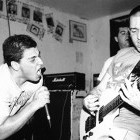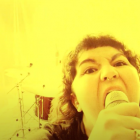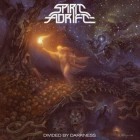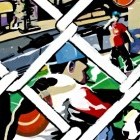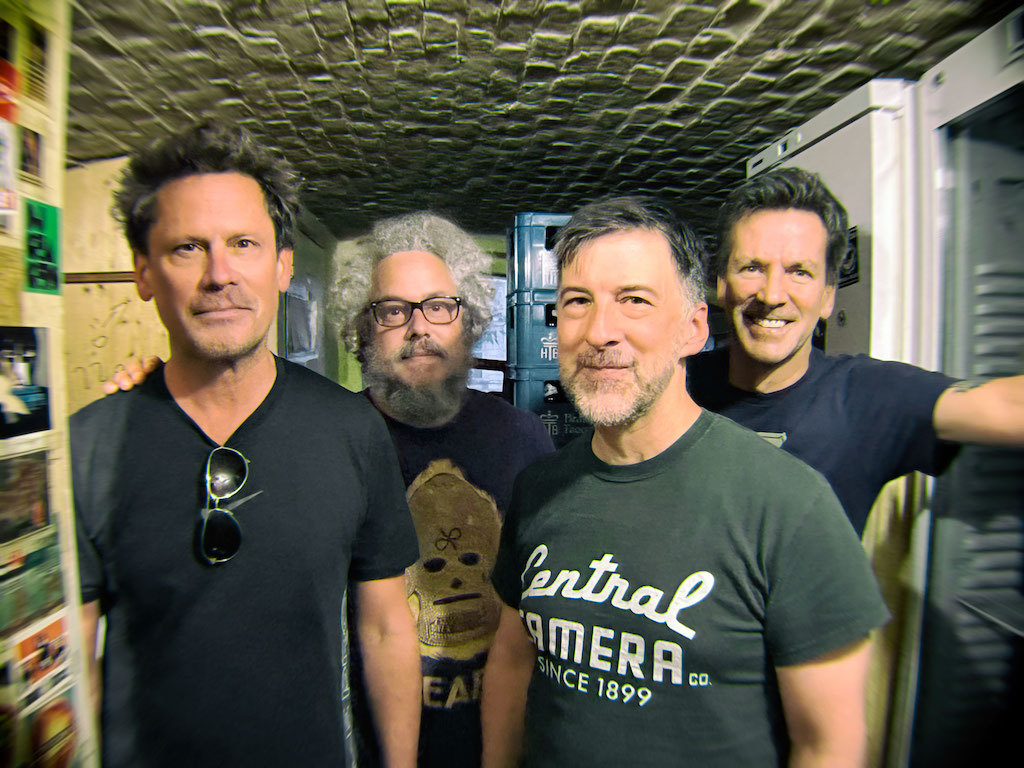
After ditching the name Lunchmeat in 1985, a group of high school friends from Washington, D.C. became Soulside, a band emblematic of the progressive ideas and sound associated with Revolution Summer.
The band went on to release several albums and EPs, including Hot Bodi-Gram (1989) which was recorded during an extensive European Tour, leading to their dissolution in 1989.
That part’s important as it’s been documented that there was friction between singer Bobby Sullivan and members Scott McCloud, Johnny Temple, and Alexis Flesig, who later formed Girls Against Boys with Eli Janney, over the Sullivan’s politically charged lyrical content.
Then life happens/happened and folks change, mature, grow, whatever, and in 2014 Soulside reunited to play the premiere show and screening of Salad Days: A Decade of Punk in Washington, DC (1980–90) by Scott Crawford, rekindling the creative spark and more importantly, getting a group of friends in a room to make their distinct sound after decades of inactivity. Riding the high, the band did a US tour in 2015, followed by a one-off show in Prague for McCloud’s 50th birthday, sharing the stage with Girls Against Boys for the first time.
Following a string of shows in 2019, Soulside released their first recorded material since the break in 1989, a two-song (three digitally) 7-inch released by Dischord Records in 2020. We’re all familiar with and exhausted by the following events of 2020 and beyond but for Soulside, they used the lockdowns to produce a new LP titled A Brief Moment in the Sun, released on November 18, 2022.
Written in four separate locations across the globe and recorded by J. Robbins at Magpie Cage Studio in Baltimore, Maryland (with help from Ian MacKaye), Soulside’s latest album retains the energy and sonic template of their later material with some noticeable and welcome differences starting with Sullivan’s vocal delivery.
Thoughtful, deliberate, and paced, Sullivan’s work on the new album shows a brighter range of both sound and scope, working cohesively with the band’s dynamic rhythms. It’s Soulside but also, it’s Soulside in the present, mixing revolutionary messages with a backbeat and layers of sound that are equal parts of each individual.
With a new album out and tour dates in the mix, I spent a Sunday afternoon talking about the lyrical themes and process of A Brief Moment In the Sun, as well as plenty of tangents (omitted for the sake of clarity) with vocalist and author Bobby Sullivan.
We met in the early-‘90s at a Food Not Bombs service in Boston and I thought that would be something interesting to start in on. Volunteering for Food Not Bombs not only changed my relationship with food but also, my relationship with people. So, Bobby Sullivan, what’s your relationship to food?
It's a pretty significant thing for me because I realized at one point that food was really at the heart of so much of what I do. At the end of the last Soulside tour in ’89, I had Epstein-Barr Virus, also known as chronic fatigue syndrome. I had really swollen lymph nodes. And the doctor said, ‘You know, it looks like you could have early stages of lymphoma, cancer but you mentioned becoming vegan—that’s probably good.’
That's when I really went deep into natural foods and started getting into raw food. I think I was vegan for a total of 10 years, and the last two years were mostly just raw food, juicing—heavy nut-based protein shakes, really easy-to-digest stuff. I got past that whole healing crisis and in the process, I think it opened up parts of my brain that weren't accessible before. That's when I really embraced spirituality. So many things just started to come together for me.
Food's my life's work. I’m still doing it. I run a food co-op in North Carolina, I’m on the board of the National Co-Op Grocers and food activism is one of the central themes of my book (Revolutionary Threads: Rastafari, Social Justice, and Cooperative Economics, Akashic Books). I’m working with a group in Jamaica to start a food co-op there, so it’s a very central thing for me.
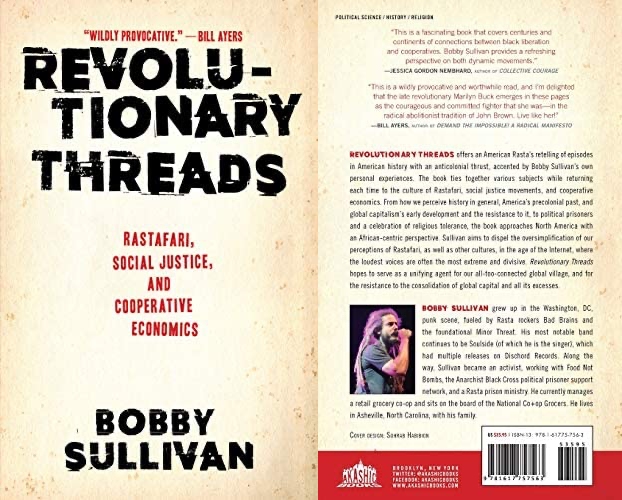
Wow. That really resonates because during my senior year of college, my lymph nodes became severely swollen—possibly by all the chemicals I was around in the printmaking department—and I had to get a biopsy. Luckily, it wasn’t cancerous but it really enforced and fostered my interest in natural foods and diet. Well, unrelated to that [laughs], I wanted to talk about the end of Soulside as a way into this new album.
From what I’ve read or heard on the fantastic End On End podcast, towards the end of the band there was a lot of conflict or debate about the topics you were exploring in the band’s lyrics. Obviously, after the split, you kept on that social/political bend with 7 League Boots and Rain Like the Sound of Trains and they formed Girls Against Boys which wasn’t an outwardly political band but now… now it seems like everyone is not only aligned politically but the rest of the band isn’t shying away from having that content in Soulside’s lyrics. Is that accurate?
That's totally the case. In fact, one of the really special things about getting Soulside back together in 2014 was getting past that whole conflict. We hadn't been bickering over all those years but in the back of my mind, I was still in conflict about all of that. Those were formative years and these were childhood friends. That breakup was really significant for me, so it was very special getting back together and realizing that these are still great guys and we really see eye to eye on most things.
I really internalized what happened with Soulside and I didn't think it was invalid in any way—I thought the conflict actually helped me grow a lot and really helped me focus on lyric writing in a different way. I like to be really explicit about what I'm singing about but other times, I think it's good not to, because you can make a song or a message more universal by making it a little vague. I think a really good example is the Coriky song “Clean Kill." You have no idea it’s about drone warfare but when you realize that you’re like, ‘Whoa!’
That song really influenced me the most of any song I’ve heard in the last few years. It snapped me back into realizing how many different ways there are to form a song, form lyrics, and express ideas about certain things without alienating people right off the bat. I think that’s really cool.
Reggae is the primary genre I listen to and it is very explicit (in its lyrical content and messages), so in a way, it was really natural for me to do that. In Rain Like the Sound of Trains, I had a kindred spirit in Pete Chramiec. He was really interested in doing that as well.
Getting Soulside back together… it turns out, everybody's really passionate about what's going on in the world these days. But I felt like if I’m going to speak, I have some responsibility because I’m speaking for the band. I think it was Johnny (Temple) who told me not to worry about that though. He said, ‘You’re the singer—nobody’s blaming the bass player for what you said.’ There’s a happy medium in there.
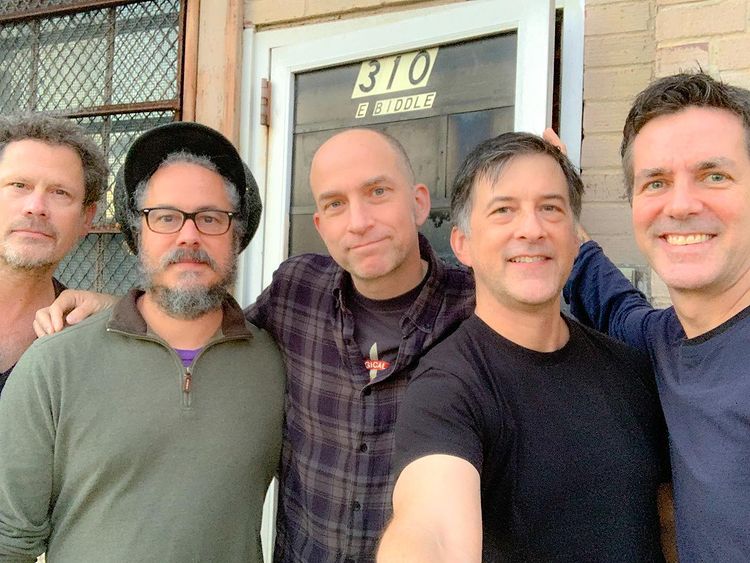
On that thread, when bands from the ‘80s reunite and even put out new music, there can often be this tone of “I told you so” in the lyrics or delivery. You know what I mean? ‘This song is about cell phones and how you’re all addicted, back in my day…’ type shit. A Brief Moment in the Sun is able to talk about current events through the lens of someone with a lot of perspective and experience without that “old guy yelling at a cloud” vibe.
How conscious were you of that in writing lyrics and was your approach informed by all the writing you’ve been doing outside of Soulside?
I was pretty intentional about taking a lot of time with each song. There were some that really do lend to just letting it stick with the historical narrative like “Rediscovery,” but there's other stuff in there that's not spoken about in the song that hopefully comes across as universal themes. “Day Two,” was intentionally vague because I thought it would have been pretty contrived to be specific about that one, but something I felt really strongly about—the day after something really significant happened.
Can you talk about that song a bit more? I thought it was interesting how there’s a dialog within the song, with the italicized lyrics that was unconventional.
Sure, I woke up the day after the capital insurrection. pretty upset, pretty angry, and confused, watching that happen in the city I grew up in, but also, it has international implications. It seemed like such an explicit expression of white privilege. And just confusing… how to reckon with that after being part of so many protests where people were getting beat down. Especially when you think of what happened to the Black Panthers and in history, what happens to people of color when they're protesting and how easily demonized they are… immigrants. That incident spoke volumes and it took me a while to figure out exactly what to even say about that.
As for Scott's backups… when we composed these songs we did demos first—we did remote demos, right? I really taunted Scott a lot or encouraged him a lot like, ‘Dude, let's fight again!’ [laughs] because that conflict that we had on Hot Bodi-Gram I thought made a really great record. We were both pulling it in different directions and you can hear it in the backups.
In the past I think there were times when he was taunting me or deliberately contradicting me. And I thought that was fine because we're a band and we all have different ideas and different perspectives. I really wanted to try to bring some of that back. I don't know what he's really getting at in that song. I think he’s just doing his own thing because of the different stages of songwriting. That was probably a song where he already had vocals going, I just did my thing, and he just popped his right in.
Jumping off that, when I was listening to the song “Reconstruction” several times it made me think about pivotal points in history that were before our time. We learn about them, we learn about how it changed society, and now we’re in a time where it feels like there’s a watershed moment every 6 months. We can start with the insurrection then go back to George Floyd and BLM, Rodney King decades before, the entire Trump presidency, 8 years of George W. Bush, and a fabricated war… you have to wonder what people will think in 50 years—‘How the fuck did all this shit happen and people didn’t rise up and make a sustainable change?’ But when I listen to “Reconstruction,” it makes me think that perhaps this current timeline is so chaotic, we can’t sustain our dissent. What do you think about that meandering question? [laughs]
Well, I think we can. I think "Reconstruction" is a perfect thing to focus on because there was a chance at that point (in history I’m referencing in the song). What happened afterward was called “redemption” and what came from that was Gone With the Wind, Birth of a Nation—that racist movie about the KKK that Woodrow Wilson showed at the White House, and this whole counter-narrative started that really whitewashed what happened during Reconstruction, and that's where, you know, books by Eric Foner and W.E.B Dubois are so important because we don't even know—until we start looking into it.
For example, I didn't know that all these Confederate monuments came many years later and were from organizations that were literally spreading false propaganda to bring some sort of impression of honor to something that was really corrupt and outrageous and dehumanizing, and I don't think there is a way to salvage it or to redeem it and yet, all of us were taught that bullshit in school. The Daughters of the Confederacy lobbied and got the monuments up, they changed our textbooks, they got that false narrative in there… that actually gives me hope—that all of that history isn't true. And that if you dig deep enough, and you don't have to go far, you can actually find out what really happened and there are really interesting spin-offs.
The Confederate army were treated like the Nazis in a lot of ways after World War Two, when the US fucking hired them. We didn't put them in prisons, we hired them. There's even this Confederate general, William Wing Loring that went and fought with Egypt to invade Ethiopia and a Confederate settlement that started in South America. There's so much interesting history from that time that we don't know about.
Many of the things you just said have such a parallel to what we see now. People from the Trump administration will get absorbed into other administrations. Let’s not forget that Elon Musk was appointed to two of Trump’s economic advisory councils, then quit in 2017 because he disagreed with Trump over climate change, then flip-flopped and backed Trump over COVID-19 restrictions, and now he’s reinstated him on Twitter, all the while, everyone calls him a genius. But people don’t care about the backstory, they forget the past and focus on the moment. My point is, it often feels like we’re in this hyperaware time where we’re not aware of anything or care about history.
To make this more of a question, as an activist with a deep understanding of activism and its history, how do you feel about the digital component of activism now?
I remember when the World Wide Web first came out. One of the really profound things for me back then was that I was really interested in what was going on in Nigeria because in Soulside one of our home bases during our ’89 tour was Amsterdam. There was a lot of activism against Shell Oil. Ken Saro-Wiwa (a Nigerian environmental activist) was in prison at the time.
Anyway, I first set up the World Wide Web on an old computer in my bedroom and I searched for Ken Saro-Wiwa and he had just been executed a few days prior and I was able to read his final statement. That was really profound. I was like, ‘Holy shit, this is really fucked up but I can find out these things in real-time and learn in real-time. That made me really hopeful. Having that knowledge is awesome when it comes to spreading the word and finding out more.
Social media has been everything - good and bad. It's been really amazing to have relationships with people that you don't live near. It's like the Star Trek phones, you know? Like what we’re doing right now in a Zoom meeting. On the social media platforms, there are all the obvious negative things that seem to predominate but what you were getting at with my version of why I’m hopeful… what I think happens is that we’re too easily defeated by the negative things going on and we’re not remembering, outside people are trying to be good to each other.
You can look at the Capitol insurrection and how maddening and hypocritical it is that they were beating police with Blue Lives Matter flag polls. It's insane. But, you know, one of those same people, I could come across them in my co-op and help them find something that they're looking for that they really need on a health level and form a bond that maybe makes them think twice about people who have dreadlocks or look different or might be “other” to them and scary.
There's a famous saying from Dr. Martin Luther King, “the arc of the moral universe is long, but it bends toward justice.”I really do believe that I have a very strong belief in the power of the people. That's what I got from studying the ‘60s and the ‘70s. And I do think that white supremacy keeps amping their narrative to the mainstream and that is very frustrating but we still have the Noam Chomskys out there and new voices too.
I’m blown away by Peniel Joseph because he has this book, The Third Reconstruction: America's Struggle for Racial Justice in the Twenty First Century. They talk about the second reconstruction being the civil rights era, and then William Barber, who's a really important activist in my area, he's head of the North Carolina NAACP, he started one of the most significant protest movements called Moral Mondays at the North Carolina State House. He just has a really cool, amazing presence.
He wrote a book called The Third Reconstruction: How a Moral Movement Is Overcoming the Politics of Division and Fear which is really what was on my mind in writing that song because he was talking about fusion politics and the hopefulness of what happened there. But then here, we have Peniel Joseph who just put this out and he's saying that the third reconstruction is happening. I wouldn't have thought that. That's pretty hopeful and I hope he's right.
I think it's very powerful to connect these historical events. It helps me realize where we didn’t get to, and now here we are in a new cycle and these are the things we have to work on now.
During the summer of 2020, I was attending a lot of peaceful protests with a friend whose parents were heavily involved in the civil rights movement. He would share a lot of what his parents taught him, and the speakers he’d go to see at Universities around Washington, D.C. and it raised some interesting questions: is there a lack of vocal, radical leaders these days simply because of the danger involved?
We have plenty of celebrities who can be vocal at times, but is it just too risky to be a thought leader in our current society, or at least in the US? For example, if AOC or any progressive Tweets something out, they’ll immediately get death threats or open themselves up to blatant misogyny.
I think that's something that activist circles learned from history and why anarchism is such an important focus—leaders are too easily disposed of or corrupted. A movement can't be just about the leader. You take out that head and the movements are gone and then there are riots. I think we've learned something along the way and that really, it's about ideas and affinity groups, sharing leadership and not demonizing people just because you don't agree with everything about them.
Hopefully, you do disagree with certain things about people, because, you know, that's how you figure out where you're at. A wise friend of mine told me at one point just don't feel that you need to be something like a Rasta, or an anarchist or whatever it is, just take what you need from all these movements and that will all help make you more whole.
Well, that leads right into another song I wanted to discuss, ‘70s Heroes. Who are some of your ‘70s heroes and why?
Assata Shakur is the easy one. I mentioned her first in that song. What an electrifying presence and the accomplishment of breaking her out of prison and getting her to safety, and her remaining that beacon of resistance, and also freedom—beating white supremacy. Then Sundiata Acoli, because I spoke to him on the phone one time and really, this song is about how I connected with these people on a personal level, which really demystified a lot. I never met Assata of course, but Dhoruba bin Wahad (American writer and activist, Black Panther Party leader, and co-founder of the Black Liberation Army), when he got out of prison there was a MOVE press conference by the kids of the movement.
EDITOR’S NOTE: MOVE is a Philadelphia-based radical movement founded by John Africa. On the evening of May 13, 1985, after a day-long armed confrontation with MOVE members, police dropped a satchel of explosives onto the radical group’s fortified rowhouse in West Philadelphia. The explosion sparked a blaze that city officials allowed to burn. When the fire was out, 61 homes were destroyed and 11 people, including five children, were dead.
Two people survived the bombing, Birdie Africa, the sole child survivor of the bombing, and Ramona Africa. Ramona Africa went to prison for a long period of time and when she got out, you know, we set up speaking engagements for her in D.C. and Baltimore and spent a lot of time hanging out and really realizing how human this demonized person was. Later, Birdie Africa went public with an interview, kind of disparaging what it was like to be a child in MOVE.
In response the kids that were in MOVE at the time, who had grown up and MOVE (Mike Africa is very active these days and there's an HBO documentary about him) had a press conference defending MOVE. Dhoruba bin Wahad was there and had just gotten out of prison and wow, what an electrifying presence that guy had… just so much passion. If you look on YouTube, he actually introduces Nelson Mandela at a speaking engagement and he electrified the whole audience—he completely blew up the whole accommodationist vibe. Nelson Mandela was shaking after Dhoruba bin Wahad spoke because Doruba had been in prison longer than Mandela and was willing to talk about what was going on in the US with political prisoners. Dhoruba was a huge hero for me, Ramona too.
Marilyn Buck was a big one for me because we had corresponded for so many years. It was also really interesting to meet in person and talk about her with Billy Ayers, one of the main people in the Weather Underground. I sent both of them my book to get their feedback.
I was interested in how the white activists interfaced with the Black Liberation Movement and how that movement interfaced with the Weather Underground. That became very valuable to learn how we can leverage our white privilege for Black liberation because ultimately that's the goal. It's obviously a theme in my book, in my life, and in my spiritual world.
I feel like there's this reckoning that the only way humanity is going to move forward is to heal things with Africa and people of African descent because of our country and the legacy of how it became a rich country. Slavery was not that long ago—it really wasn’t—obviously, those wrongs have not been righted.
I think it’s easy to forget how many things weren’t that long ago—the Civil Rights Movement… LGBTQ+ rights that are now under fire, Roe v. Wade was only in 1973. And part of learning that history and the history of what really happened, specifically in the United States, a lot of folks are going to feel a synergy with “getting the real history of history” but their version is conspiratorial—the “deep state” or “the media lies.”
What do you think the difference is between the truth you’re uncovering and learning about and more conspiratorial thinking? At the root of it, there is some synergy we all feel about being lied to.
Of dissent, right? I think you have to be anchored somehow. For me, I would point to my spirituality, it's kind of like the same thing. When GMOs came out… ‘that’s not Ital!’ Rastaman would say. I didn’t have to guess what I felt about GMOs and that’s not going blindly against them. I had core ideas to guide me about the importance of natural food and a suspicion about overly processing things.
My God, with the insurrection I mean, it's profound how ideally everyone would know that you don't kill a police officer because you want to get in the Capitol and overturn an election. I don't even understand how they could have gotten to that place except to think that they could get away with it because of their white privilege. I don't understand that part, but I see what you're saying. That's why we do have to have our anchors in the right places and do our work and study people like W.E.B. Dubois and Ian MacKaye even, Howard Zinn, Noam Chomsky, and Callie House. How do people we have a deep respect for move forward in challenging situations? What would they do?
Right, and I don’t think the people who stormed the Capitol are coming from that place. They aren’t trying to elevate others, they feel that their privilege has been taken away. They witnessed an entire summer where Blackness was being celebrated and instead of joining in, they wanted to reclaim their whiteness.
It’s so interesting the way that capitalism and white supremacy use people under the guise of nationalism, even though it’s a global thing. And yet, it's so fucking unpatriotic, what they're getting people to do. It’s this bait-and-switch thing that’s happened over and over again in history, where these people actually aren’t even fighting for their own interests.
If you're fighting to get Donald Trump back in office, you're fighting for a rich white guy who has lied, cheated and stolen his way to where he's at. He's not given any of it to you. I think that the larger question is, how are these people so easily manipulated? I'll look at myself too, and try to look at ways that I have been as well by my own romantic ideas.
And what also blows my mind is that there are so many folks from punk or hardcore that feel that what happened at the Capitol is punk but not BLM. A lot of people started to really show their stripes during the Trump presidency, especially in hardcore and punk and that brings me back to Soulside and how this conversation started.
Why is it that it seems that so many people from your scene and era in Washington D.C. stuck with their progressive ideas and didn’t go right as a lot of peers do as they get older?
In my little piece of it, I was very motivated by ideas. You know, it's like the Soulside song “New Slow Fucky”: I’m in the mood for one too many… ideas. It's alluding to partying but in the end, it's about staying up late with somebody, not just in D.C., but all over the world and really, what it’s about is vibing on these ideas. When Rain Like the Sound of Trains played in a bomb shelter after the war in Yugoslavia and they had Food Not Bombs feeding refugees, that’s what’s always driven me because I frankly wasn’t drawn to the music at first.
The activism and the ideas really engaged me. I mean, there are a lot of bands that people would just write off for being knuckleheads to some extent, but when you really know people and work together on things, it's different. We played with a lot of bands like that and it turns out, there's a lot of heart and intellectual activity going on in those circles.
Also, I think it's possible people in D.C. just haven't come out. [laughs] There are probably the right-wing people who aren’t saying so strategically. Thankfully, that first generation of D.C. hardcore and Ian MacKaye especially deserve a lot of fucking credit for being consistent and mentoring so many people. Think of all the people that Ian's written letters back to—that really makes a difference in the world. Having someone like that, kind of at the helm. And then you have Mark Andersen (Positive Force) with all those shows centered around so many important causes. I think that's probably why DC is still very progressive.
I think one of Ian’s underrated superpowers is how thoughtfully and explicitly he can tell someone “no.” No, I’m not doing your interview or playing your venue and I’m going to take as much time as I need to explain exactly why.
[laughs] Agreed. And I’ve seen a lot of it.
OK, last question for you. Everyone had to make sacrifices and lost things during the pandemic, specifically during lockdowns. We lost loved ones, we lost work, and some people felt like they lost freedom. In music—punk, hardcore, whatever genre—I know this impacted a lot of musicians but at some point, it started to feel selfish: I can’t tour and make a living and play shows and that’s unfair. Sure, yeah, we’re all not having a great time right now.
So, my question is, while a lot of people were focusing on what they didn’t have or couldn’t do, it seems like you and the band focused on making something in this album. In a way, the pandemic actually gave Soulside something. Is that fair?
Yeah, and I have to give a lot of credit to Johnny Temple, Soulside’s bass player, for being the guide and the motivation—the facilitator of really making it all happen. He's a great editor. Not only with his publishing company but he's really good at saying ‘Actually, this part sucks. we're taking this part out. And here's what we're gonna do with this other thing.’ Johnny has been one of my closest friends my whole life and he's always the guy that is taking me where I didn't know we were going.
My very first brush with the greatness of getting to know people behind the music, was going to a Toots and the Maytals show. We were too young to get in and Johnny had the idea that we would just pay the roadie and get in through the back door. And it worked! Because we were ushered in the back, we ended up in the front row, and then we were on stage with Toots and the Maytals at the end of the set dancing with the band. Afterwards we're like, ‘OK, yeah, let's go out back. Maybe we can talk to the band,’ and we meet Dr. Dread who's also hanging out and we ended up working for RAS Records… completely changing our lives. And Johnny’s still doing that shit!
He was a prime motivational force and it’s possible that Alexis (drummer) and Scott (guitarist) were in ways I didn’t know because Johnny was facilitating the tracks and dealing with me individually. We weren’t getting together as four people all the time hashing things out. The musicians were hashing things out and then handing stuff to me. Then my stuff would go back to them. I was lucky enough that I was an essential worker during that time, too, so I didn't lose income. And I was socially engaged at work. However, I've never worked in a more volatile situation ever. The other guys had different experiences, so I think we came to it from different places. But the lockdown gave us the time to really do it right, or at least how we felt was right. One of my favorite things about being in Soulside is how we developed songs on tour because we would have an improvisational part of the set every night, which looking back on it, I think, was very brave. You're in front of an audience and you're just going to improv a song because it's not finished. That really helped us form things in front of people and get reactions. I think it speaks to the genre, as well as the scenes that are very forgiving, and you're not up there to be perfect, and you really can try things out and maybe it sucks, and hopefully, it doesn’t. [laughs]This was really different in the sense that it was the first time that we really composed things in a vacuum, where it was just us just fine-tuning those songs and being honest with each other about what was working and what wasn't working.
That difficult time definitely gave us something.
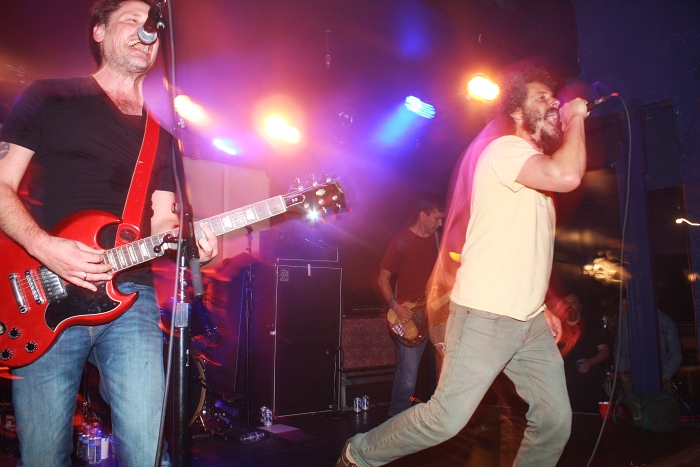
If you’re interested in reading about some of the topics discussed in this interview further, Bobby Sullivan recommends the following titles:
- My Face Is Black Is True Callie House and the Struggle for Ex-Slave Reparations by Mary Frances Berry
- Assata: An Autobiography by Assata Shakur
- Night-Vision: Illuminating War & Class on the Neo-Colonial Terrain by Butch Lee and Red Rover
- Drawing the Global Colour Line White Men's Countries and the International Challenge of Racial Equality by Marilyn Lake & Henry Reynolds
- From Toussaint to Tupac The Black International since the Age of Revolution edited by Michael O. West, William G. Martin & Fanon Che Wilkins
- The Third Reconstruction: How a Moral Movement is Overcoming the Politics of Division and Fear by Reverend Dr. William J. Barber
***
A Brief Moment In the Sun is available now via Dischord Records.
***
Help Support What No Echo Does via Patreon:
***
Tagged: soulside

